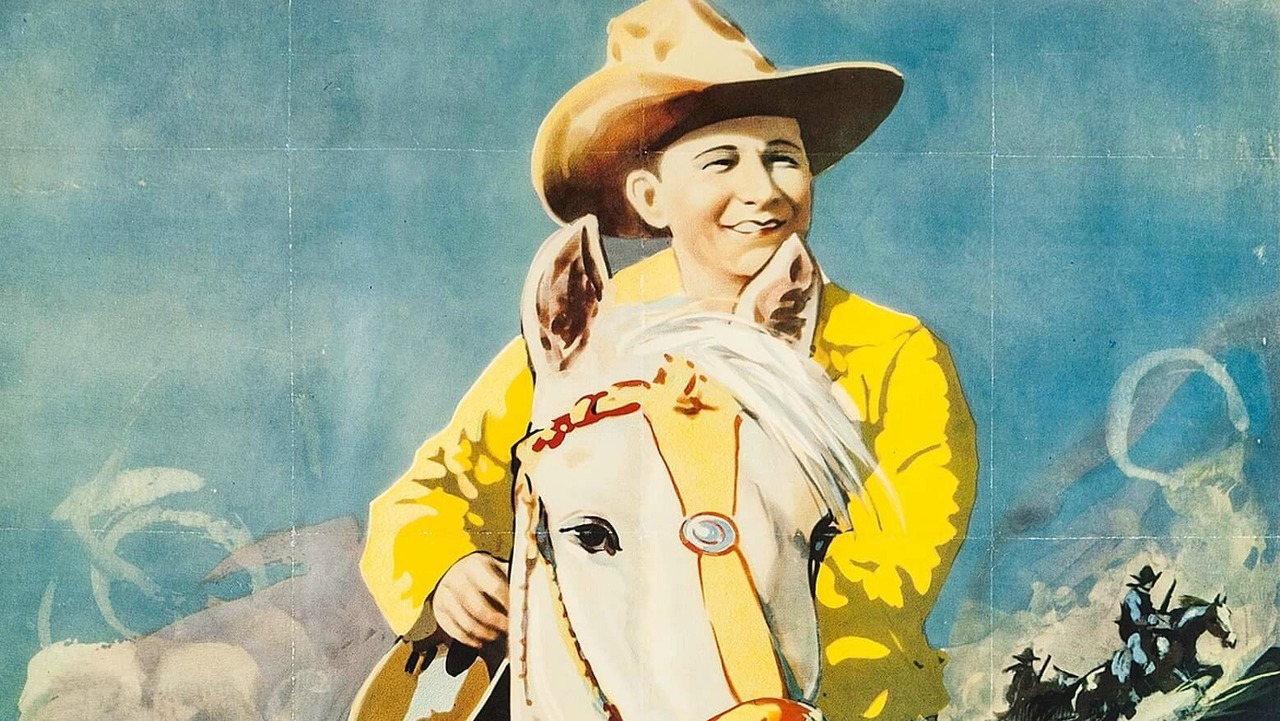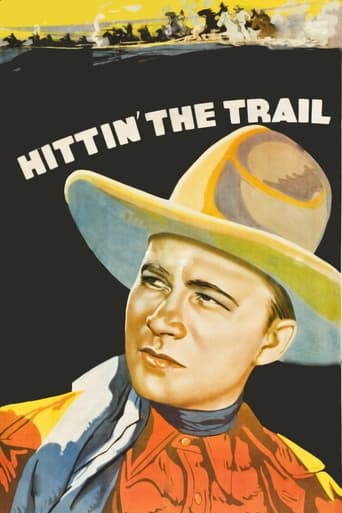


Don't listen to the Hype. It's awful
... View MoreBest movie ever!
... View MoreAbsolutely the worst movie.
... View MoreOne of the film's great tricks is that, for a time, you think it will go down a rabbit hole of unrealistic glorification.
... View MoreAfter shaving, horse-trader Tex Ritter (as Tex Randall) and cleaned-up partner Hank Worden (as Hank) are mistaken for outlaws. They are quickly freed, as the plot seems to forget where it's going. Mr. Ritter is framed for some illegal horsing around. There ought to be a law. The DVD sleeve claims, "Action and suspense blend perfectly in this original, exciting Western." In your dreams. There are about one-and-a-half good songs, at least. And, it's amusing to watch Mr. Worden's background facial expressions.** Hittin' the Trail (4/3/37) Robert N. Bradbury ~ Tex Ritter, Hank Worden, Earl Dwire, Tommy Bupp
... View MoreThe guys Hittin' The Trail are Tex Ritter and his sidekick Hank Worden who have a string of horses when they are mistaken for the notorious Tombstone Kid and his outlaw henchman. Of course Tex and Hank are cleared later and the sheriff releases them, but that only gets them in deeper involved in the local outlaw situation.Either a bad script or bad editing made the plot a bit vague and hard to follow. The film seems to have eschewed Ritter the cowboy hero for Ritter the country and western singing star and musical numbers abound in Hittin' The Trail. It's the saving grace of the film.It also shows what a bad reputation will get you as the real Tombstone Kid is a convenient place to put blame for all the lawbreaking committed by the film's real villain Earl Dwire who was in many a John Wayne B western for the various companies he worked for in the Thirties. Of course it all gets straightened out in the end, much to the satisfaction of the rancher's daughter Jerry Bergh.Ritter's film career might have been better served had he been one of Republic's stable of cowboy heroes. As it is this film was done by the shortlived B studio Grand National and the seams do show.
... View MoreBig time horse thieves manipulate Tex and his partner Hank into transporting stolen horses across the border where they plan to kill them.Tex Ritter was a great singer and one of the most likable of all the B-western stars. Here his charismatic charm and singing ability makes up for the lack of action or suspense in the first two-thirds of the film.An abundance of lively music, including Tex's memorable rendition of "Blood On The Saddle" and an appearance by western singer (and writer of "Back In The Saddle Again") Ray Whitley and The Range Busters, make the slow parts worth watching despite the thin plot. It all really helps elevate this to the level of an above average singing cowboy picture.The neat climax is worth waiting around for.
... View MoreIf you like music, and even if you don't, this is one of Tex Ritter's better 30s films. It might really be called a musical since it features seven songs. The upbeat opening song, "Heading for Town," showcases Tex's genial and sincere personality; he gives a short semi-comic version of one of his trade mark songs, "Blood on the Saddle"; he does "Hittin' the Trail," all good songs. Tex does a fine version of "I'm a Natural Born Cowboy," a sort of pre-cursor to Bing Crosby's "I'm an Old Cowhand." We get the clichéd group vocal riding song "The Vagabond Song," and even Tommy Bupp sings in his biggest movie scene doing a creditable job on "I'm a Rippin' Snortin' Sheriff." Unfortunately, since he's no off key singing, comic mugging Alfalfa, we'll pass on him.As a super bonus, though, we get Ray Whitley's band singing and playing Ray's excellent "Texas Washboard Rag," which reflects the musical influences of ragtime music and scat singing. The performance reminds us that, for those unfamiliar with Spike Jones, the washboard, augmented here with bicycle horn and copper pots, was a staple of thirties Western movie bands. It was Spike Jones in the forties who elevated the augmented washboard to orchestral instrument status.But what about the movie? It's one of the better Grand National efforts. After the upbeat opener, the Tombstone Kid, an 'outlaw', trades horse with Tex, and quotes the Bible -- bread cast on the water returns to you. Then we're off and running with the action including all the formulaic elements of these films, here all well done: Tex being wrongly accused; Earl Dwire nicely evil as Clarke, the rich saloon owner and horse rustler, who swindles Tex; a good fight with Charles King at the outlaws' hideout; Tombstone returning at the end to rescue and aid Tex; and a fine elaborate final chase sequence involving about a hundred horses and horsemen, as Tex and the sheriff chase Clark and his henchmen as they drive the stolen horses through 'the pass.' Note: There is no dumb sidekick 'comic' relief in this one. That really helped it! Hank Warden, who was in over 200 movies and TV shows, (mostly westerns) was the no nonsense sidekick, but he only appeared briefly except for duetting with Tex in the opening song. You can see him do a hick country dance in Tex's 'Trouble in Texas' (1937), and as the parson in 'The Alamo' (1960) among his many, many appearances.The development of the story, the editing and the many great songs set it apart from other formulaic oaters of the period. I'd give it a 5 just for the music.
... View More